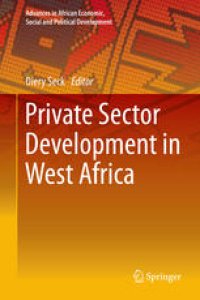
Ebook: Private Sector Development in West Africa
Author: Diery Seck (eds.)
- Tags: Development Economics, Economic Policy, Political Economy, Regional/Spatial Science
- Series: Advances in African Economic Social and Political Development
- Year: 2014
- Publisher: Springer International Publishing
- Edition: 1
- Language: English
- pdf
This book examines key determinants of private sector development in West Africa, putting special emphasis on government’s cardinal role in fostering and supporting entrepreneurship. Favorable macroeconomic conditions are identified and it is shown that adequate policies that contribute to economic diversification and industrialization are likely to expand the investment base of the economy. The book also examines new business concepts and regional integration initiatives meant to enhance West Africa’s private sector and analyzes the role of finance in promoting development of private firms and the extent to which corruption impedes economic growth. All chapters are highly relevant to West Africa’s current policy challenges and therefore inform the region’s ongoing policy formulation. The empirical evidence supporting the policy recommendations is based on both qualitative field observations and advanced quantitative estimation techniques.
This book examines key determinants of private sector development in West Africa, putting special emphasis on government’s cardinal role in fostering and supporting entrepreneurship. Favorable macroeconomic conditions are identified and it is shown that adequate policies that contribute to economic diversification and industrialization are likely to expand the investment base of the economy. The book also examines new business concepts and regional integration initiatives meant to enhance West Africa’s private sector, and analyzes the role of finance in promoting development of private firms, and the extent to which corruption impedes economic growth. All chapters are highly relevant to West Africa’s current policy challenges and therefore inform the region’s ongoing policy formulation. The empirical evidence supporting the policy recommendations is based on both qualitative field observations and advanced quantitative estimation techniques.